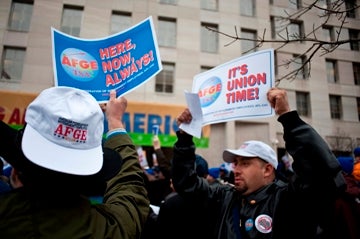Empower Workers, Not Unions with Political Agendas
Ericka Andersen /
Claire Waites, an Alabama school teacher who joined the local teachers union to obtain liability insurance, was pressured by her union to donate to the NEA Fund for Children. In reality, she found out later that the funds went to political action groups chosen by the union—which turned out to be in support of John Kerry in 2004 and Barack Obama in 2008. Waites was furious and recently testified about the situation on the House floor.
As it stands, the law empowers unions over employees when conflict arises. This is the opposite of how America should be, and there are several things being done to combat it.
One of them is the Employee Rights Act (ERA), which would protect private-sector workers from union pressure and extortion. This law wouldn’t specifically protect Waites, because she works for a government union, but it would go a long way for those with the same issues in the private sector.
Simply put, individuals would have a say in what kinds of political causes (if any) they care to endorse monetarily through the union. The ERA would require unions to get permission from workers before spending their dues on politics. James Sherk, Heritage Foundation senior policy analyst in labor economics, explains that the act would actually “shift the balance of power in the workplace from unions to workers.”
The truth is that most union members oppose their unions’ active political spending. Polling shows that 60 percent of workers object to their money being spent in this way. Unfortunately, the law currently protects the union action. In 2010, the AFL-CIO devoted one-sixth of its national budget to politics and lobbying. Most of that money goes toward liberal candidates who, in turn, do the union’s bidding.
In addition the ERA would guarantee every worker enough time to research the costs and benefits of unionizing before voting—no snap elections. Unions would also have to regularly stand for re-election as workers’ bargaining representatives, allowing workers to hold them accountable.
The House Oversight Committee, lead by Representative Darrell Issa (R–CA) is committed to fighting this rampant abuse with a new site, “Protecting American Workers,” where employees affected by partisan politics in their union are encouraged to speak out against the infringement on their personal freedoms. The home page of the new site explains why individuals should come forward and stand up for their rights:
Workers should decide how their hard-earned money is spent. They should know how their dues are spent…because personal freedom isn’t partisan: it’s American. We are committed to working with everyone—workers, union leaders and each other—to restore workplace freedom and fairness for all Americans.
Already, three individuals have come forward to call out their unions for abuse. House Oversight sent letters this week to their unions—SEIU, UAW Local, NEA and Alabama EA.
Unions spent a reported $1.1 billion on politics and lobbying in the 2010 election cycle (LINK). How much input did the union members—whose dues funded those contributions—get? Many support the individual provisions of the ERA, and that ought to tell you something about how well people feel their rights are currently being upheld. Who wouldn’t want the “paycheck protection” that is included in the ERA? As Sherk explains:
The “paycheck protection” requires unions to obtain employees’ permission before spending dues for purposes—like political activism—unrelated to collective bargaining. Employees would be free to support these activities, but the union would have to get their permission first. Union members support this proposal by a 4-to-1 margin.
Employees should not be afraid to stand up for their rights and demand that their money be spent fairly and transparently. Unions have a chokehold on the American political scene, and the power has gone to their heads. It’s time to restore employee rights and empower individuals to resist union pressure. That’s the American way.

